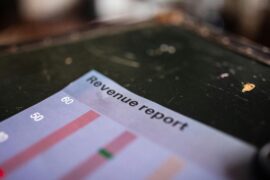This article may contain references to products or services from one or more of our advertisers or partners. We may receive compensation when you click on links to those products or services. Nonetheless, our opinions are our own.
The information presented in this article is accurate to the best of our knowledge at the time of publication. However, information is subject to change, and no guarantees are made about the continued accuracy or completeness of this content after its publication date.
Day trading moves at a lightning-fast pace, and new traders often discover there’s a steep learning curve to becoming consistently profitable. The allure of quick gains can tempt beginners into jumping in headfirst without fully grasping the risks. In fact, a large body of evidence shows that most day traders lose money over time (CNBS), underscoring how costly early errors can be.
From panic-selling at the first sign of a downturn to risking too much on a “sure thing,” common day trading mistakes can quickly derail a newcomer’s ambitions. The good news is that by recognizing these pitfalls early, beginners can learn to navigate the markets more safely and build better trading habits from the start.

A beginner day trader reacts to a losing trade. The fast-paced nature of day trading combined with inexperience can lead to costly mistakes if one isn’t prepared. Image credit: Pexels
1. Trading Without a Plan or Strategy
One of the biggest rookie mistakes is diving into day trading without a clear plan or strategy. A Forbes article notes that an absence of a solid trading plan often leads to “random and emotional” decisions. Beginners sometimes buy and sell on gut feeling, hot tips, or hype, rather than following a tested strategy. This lack of planning means trades have no defined entry/exit points or risk management rules. The result? Inconsistent and impulsive choices that erode capital.
How to avoid this mistake: Develop a concrete trading plan before you trade a single dollar. Determine what strategy you’ll use (e.g. momentum trading, breakout trading), and when you will enter and exit positions. Set rules for how much you’re willing to lose on a trade (your stop-loss) and your profit targets. It’s wise to practice your strategy on a demo account first to see how it performs under real market conditions. (Many platforms, including markets4you.com, offer free demo accounts for beginners to test strategies risk-free.)
2. Poor Risk and Money Management
Ignoring risk management is a surefire way to blow up a trading account. New traders often make the mistake of betting too big or failing to protect themselves if a trade goes south. For example, risking your entire account on one trade or using excessive leverage (borrowed money) can lead to outsized losses. Even a single bad trade can wipe out weeks of gains if you overexpose yourself. Another common error is not using stop-loss orders – automatic sell orders that limit your downside on a trade.
How to avoid this mistake: The key is disciplined risk management on every trade. First, never risk more than you can afford to lose – a classic guideline is risking only 1-2% of your account per trade. This ensures no single bad trade will be catastrophic. Use stop-loss orders to automatically cap your loss if the market moves against you. Equally important is position sizing: start small, especially as a beginner. Rather than “making big bets instead of starting small” (Bloomberg), trade in small quantities to learn how the market behaves.
Voted "Best Overall Budgeting App" by Forbes and WSJ
Monarch Money helps you budget, track spending, set goals, and plan your financial future—all in one app.
Get 50% OFF your first year with code MONARCHVIP
3. Trading on Emotion – Fear and Greed
Emotions are a trader’s worst enemy. Emotional trading – letting fear or greed drive decisions – causes many of the classic blunders that beginners experience. For instance, the fear of missing out (FOMO) can push a new trader to chase a hot stock or jump into a surging trade late, just as the trend is about to reverse. Conversely, fear can also paralyze a trader into exiting winners too early at the first dip, missing out on gains because they’re afraid to lose any profit. On the flip side, greed and overconfidence after a few wins might lead a beginner to double down on risky positions or abandon their plan in hopes of a big windfall.
How to avoid this mistake: The antidote to emotional trading is having structured rules and a disciplined mindset. Stick to your predefined trading plan and stop-loss levels – these were set when you were rational, and they exist to protect you when emotions flare. To combat fear and greed, try to cultivate a mindset where you treat trading as numbers and probabilities, not as personal wins or losses. Keeping a trading journal can help: after each trade, write down why you entered/exited and what you were feeling. Over time, you’ll spot patterns (e.g. “I always regret it when I impulsively buy because of a news headline”). Some beginners find it useful to set maximum loss limits per day or week – if you hit that, you step away from trading to cool off.
4. Chasing Hype and Overtrading
Today’s markets move quickly, and beginner traders often think they need to trade constantly to make money. However, overtrading – taking too many positions or trading too frequently – is a recipe for mistakes. Each trade comes with transaction costs (like spreads or commissions) and mental energy. By trading excessively, beginners tend to take subpar setups out of impatience or boredom. This increases exposure to bad trades.
Closely related is the mistake of chasing hype or hot tips. It’s all too easy for a novice to see a stock shooting up (or a cryptocurrency “going to the moon” on social media buzz) and then pile in at the worst moment. Buying just because everyone on Reddit or CNBC is talking about an asset often means you’re late to the party.
How to avoid this mistake: Be selective and patient. Remember that in day trading, quality matters more than quantity. It’s better to take a few well-researched trades than dozens of scattershot bets. Avoid the noise by setting criteria for your trades (for example, “I only trade stocks that meet X, Y, Z conditions”). If a stock is skyrocketing and you’re not already in it, resist the urge to impulsively jump aboard without analysis. Often by the time a trend is obvious and everyone is talking about it, the opportunity has passed or the risk is extremely high. Do your own due diligence on any trade – check the news, understand why the price is moving, and make sure it fits your strategy before you commit.
5. Skipping Education and Practice
Day trading may seem straightforward – buy low, sell high – but it actually demands a solid foundation of knowledge and skills. A common mistake among beginners is neglecting education and jumping in without fully understanding the tools and the market they’re trading. This can manifest in various ways, such as not knowing how to interpret charts or technical indicators, or being unaware of important market events (earnings announcements, economic data releases) that can cause sudden volatility.
How to avoid this mistake: Never stop learning. Before risking real money, take advantage of the wealth of educational resources available. This includes tutorials, online courses, webinars, and reputable books on trading. Many top brokers and trading platforms (like Markets4you) provide free educational content for their clients – from basic trading guides to advanced strategy webinars. Make use of these to build your knowledge of market mechanics, technical analysis, and trading psychology. It’s also beneficial to practice in a simulator or demo account until you feel confident. Treat your demo trades seriously as if the money were real – this will help build good habits.
When you start live trading, consider it an extension of your learning. Keep a journal of trades and regularly review it to identify patterns in your performance. Did certain types of trades consistently lose? Did you violate your own rules? By analyzing these, you can pinpoint weaknesses and work on them. Remember that even experienced traders continuously educate themselves and adapt; markets evolve, and strategies may need tweaking over time. By committing to ongoing education and reflecting on each trading experience, you’ll steadily improve and avoid repeating those early blunders.

Successful day trading requires preparation and practice. New traders should take the time to educate themselves, test their strategies, and learn from each trade – instead of rushing in blindly. Image credit: Pexels
Conclusion: Trade Smart from the Start
For beginners in the day trading arena, mistakes are part of the learning process – but they don’t have to be ruinous. By being aware of these common day trading mistakes and actively working to avoid them, you set yourself up for a much smoother journey. Start with a solid plan, manage your risk on every trade, keep your emotions in check, and never stop learning. It’s also helpful to use a supportive trading platform that caters to beginners. For instance, markets4you.com offers user-friendly tools, a free demo account, and educational resources that can help novice traders practice and hone their skills in a safe environment.
Day trading will always have a learning curve, but with discipline and the right approach, you can climb it successfully. For further guidance on improving your trading habits, you might explore How to Avoid Common Trading Mistakes on Markets4you’s official blog, which provides additional tips and insights. By learning from experts and using the right resources, even a beginner can trade smarter – avoiding the typical pitfalls and steadily progressing toward their trading goals.

Reviewed and edited by Albert Fang.
See a typo or want to suggest an edit/revision to the content? Use the contact us form to provide feedback.
At FangWallet, we value editorial integrity and open collaboration in curating quality content for readers to enjoy. Much appreciated for the assist.
Did you like our article and find it insightful? We encourage sharing the article link with family and friends to benefit as well - better yet, sharing on social media. Thank you for the support! 🍉
Article Title: Common Day Trading Mistakes Beginners Should Avoid
https://fangwallet.com/2025/05/11/common-day-trading-mistakes-beginners-should-avoid/The FangWallet Promise
FangWallet is an editorially independent resource - founded on breaking down challenging financial concepts for anyone to understand since 2014. While we adhere to editorial integrity, note that this post may contain references to products from our partners.
The FangWallet promise is always to have your best interest in mind and be transparent and honest about the financial picture.
Become an Insider

Subscribe to get a free daily budget planner printable to help get your money on track!
Make passive money the right way. No spam.
Editorial Disclaimer: The editorial content on this page is not provided by any of the companies mentioned. The opinions expressed here are the author's alone.
The content of this website is for informational purposes only and does not represent investment advice, or an offer or solicitation to buy or sell any security, investment, or product. Investors are encouraged to do their own due diligence, and, if necessary, consult professional advising before making any investment decisions. Investing involves a high degree of risk, and financial losses may occur including the potential loss of principal.
Source Citation References:
+ Inspo
There are no additional citations or references to note for this article at this time.












































